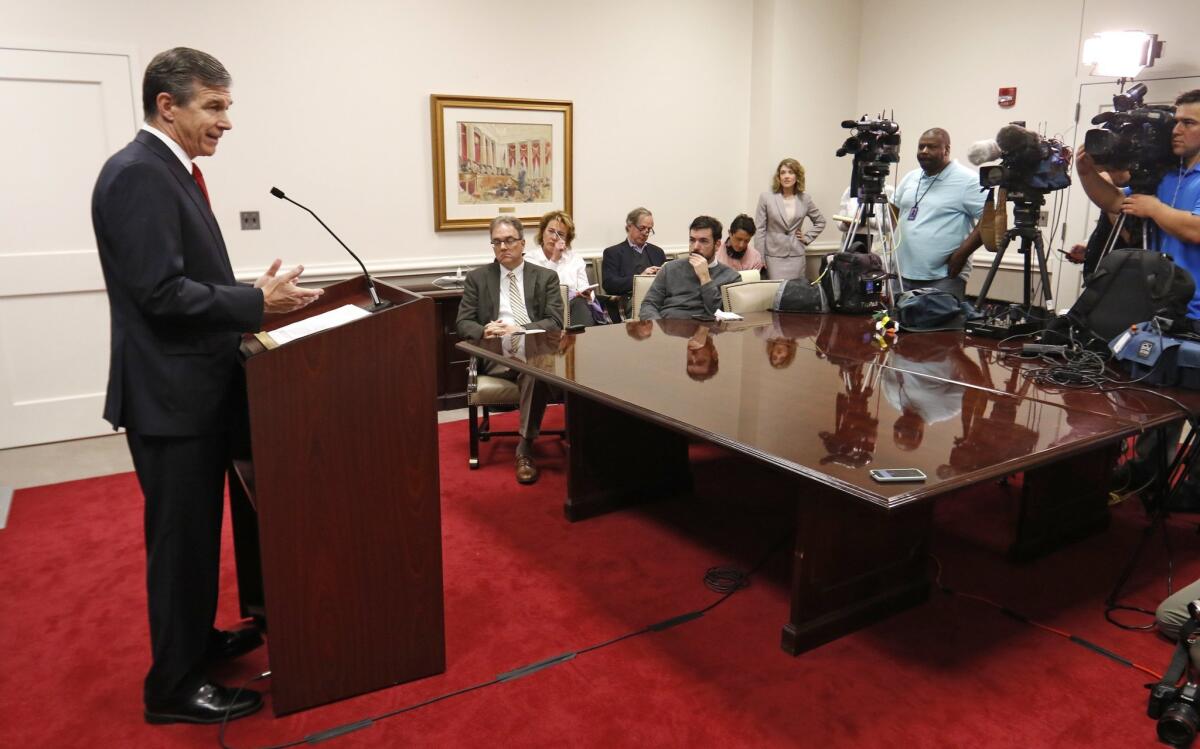Op-Ed: Can a state’s attorney general pick and choose which laws to defend?

North Carolina Attorney General Roy Cooper speaks at a news conference in his state offices in Raleigh, N.C. on March 29.
Almost as soon as North Carolina passed House Bill 2, which preempted locally enacted civil rights protections for gay and transgender people, the state’s attorney general, Roy Cooper, announced that his office would not defend it against the inevitable constitutional lawsuits. Cooper, who is running for governor in North Carolina, called HB2 a “national embarrassment” and insisted it was unconstitutional.
The attorney general’s decision represents a trend. More and more state attorneys general are refusing to defend divisive laws, especially those championed by opposition party governors and legislatures. Many seem to have concluded that nondefense of state laws is an option to be exercised in the service of politics.
Until 2008, nondefense was almost unheard of. That year then-California Atty. Gen. Jerry Brown refused to defend Proposition 8, which banned same-sex marriage in the state. Since then, 16 other attorneys general have refused to defend state laws. Democrats refuse to defend gun rights legislation and anti-same-sex-marriage laws. Republicans refuse to defend campaign finance restrictions, gun control laws and protections for gays and lesbians.
In large part, refusing to defend is a byproduct of the sharp Republican-Democrat divide that pervades today’s politics. Before the divide, state legislation often garnered support from both Republican and Democratic voters and politicians; in that context, attorneys general couldn’t count on scoring political points by refusing to defend laws. But now refusals to defend can be a surefire means of currying favor with interest groups and voters who fiercely oppose some state laws, and attorneys general wield their control of litigation for political reasons.
Consider the 2014 race for Wisconsin attorney general. Democratic candidates pledged not to defend voter identification laws or the state’s ban on same-sex marriage; the Republican candidate pledged not to defend a domestic partnership law.
States ... need to reconsider the function of attorneys general and how best to defend the constitutionality of state laws.
In 2015, Illinois’ Democratic Atty. Gen. Lisa Madigan announced that she was defending a state labor statute by seeking to block Republican Gov. Bruce Rauner’s lawsuit challenging the constitutionality of “fair share” union dues. On Friday, California antiabortion groups gathered outside Atty. Gen. Kamala Harris’ office demanding she resign for opening an investigation into the local activist who secretly taped meetings with Planned Parenthood.
The absence of clear state laws regarding the powers and responsibilities of attorneys general is partly to blame for these partisan squabbles. A few states require that the attorney general defend all laws; a few make clear that the decision to defend is up to the attorney general; most say nothing at all about the question.
Even when state law defines the attorney general’s job, politics can intrude. North Carolina mandates that its attorney general “defend all actions in which the state may be a party” and “represent all state departments.” Cooper has justified his refusal by saying his first obligation is to defend state agencies that do not want to abandon their antidiscrimination policies. Gov. Pat McCrory, against whom Cooper is running for the governorship, castigates the attorney general’s decision as “politically expedient.”
This is not the first time McCrory and Cooper have locked horns over the refusal issue. Cooper and his office defended North Carolina’s voter identification law in federal court — even though Cooper had publicly opposed the measure and created an online petition urging the governor to veto it. McCrory didn’t pat him on the back for doing his job in that case. Instead, the governor spent state money to add other lawyers to the effort to uphold the statute. The governor’s chief legal counsel claimed that Cooper could not be trusted to offer a vigorous defense of the measure.
Attorneys general have always been political creatures and so, in one sense, nothing is new here. And yet states ought not ignore the uptick in nondefenses and charges of lawlessness and bad faith that result from it. They need to reconsider the function of attorneys general and how best to defend the constitutionality of state laws. Indifference to such questions should come to an end.
Neal Devins is a professor of law at William & Mary. Saikrishna Prakash is a professor of law at the University of Virginia. They are the authors of a study of attorney general refusal published in the Yale Law Journal in 2015.
Follow the Opinion section on Twitter @latimesopinion and Facebook
More to Read
A cure for the common opinion
Get thought-provoking perspectives with our weekly newsletter.
You may occasionally receive promotional content from the Los Angeles Times.






